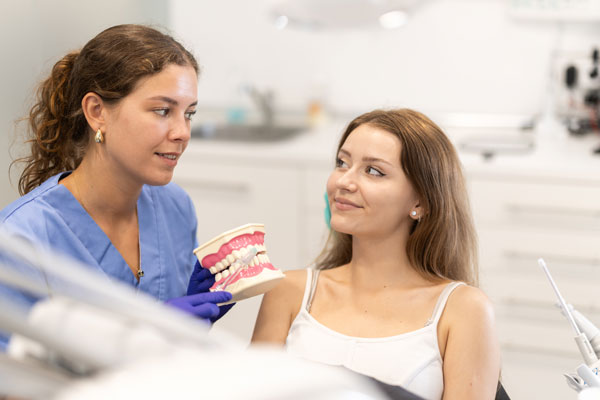The Importance of Regular Check-ups with a Family Dentist for Every Age

No matter your stage in life, maintaining a healthy smile is important. Regular visits to a family dentist provide comprehensive care for people of all ages, ensuring a lifetime of healthy smiles. These routine check-ups address immediate concerns, can prevent future dental issues, and provide you and your family with the information you need to promote good overall health.
The importance of prevention in regular dental check-ups
Dental problems, when caught early, are often easier and less expensive to treat. For example, a family dentist detecting a small cavity can often treat it with a simple dental filling. In contrast, neglecting it could lead to further decay and require a dental crown, root canal, or, in severe cases of decay, extraction.
Family dentists also focus on patient education. This information gives individuals the knowledge to care for their teeth effectively at home based on their unique needs. For example, if the dentist notices that the patient is prone to gingivitis or cavities, they may recommend proper brushing and flossing techniques or equipment, such as using a water flosser or an electric toothbrush to clean their teeth better.
Family dentists may also recommend healthy dietary and habit changes, such as cutting down on staining foods and quitting tobacco use. These personalized insights can help patients maintain their long-term oral health by working with a trusted dental professional.
Dental care at every stage of life
Early dental care
A strong foundation for lifelong oral health begins in childhood. Taking children to a family dentist can introduce them to the importance of oral hygiene and familiarize them with the dental care process. This dental professional will monitor the young patient's oral health and development, identifying potential issues, such as misalignment, improper oral habits, and tooth decay. Many family dentists also offer preventive treatments like flouride varnish, dental sealants, and orthodontic methods to prevent long-term oral health complications.
In addition to treatment, regular check-ups with a family dentist encourage children to develop a positive association with dental care. Many adults can trace their fear of dental care to negative experiences when they were children, which can lead to skipping dental visits altogether. Establishing a strong and trustworthy relationship with a family dentist can reduce anxiety about future visits, making it more likely that children will maintain good oral health habits into adolescence and adulthood.
Adolescent dental care
As children transition into their teenage years, their oral health needs evolve. Many adolescents are particularly susceptible to dental issues such as cavities, gum problems, and orthodontic concerns. These issues may be due to factors like a diet of sugary foods and drinks, hormonal changes, and the eruption and growth of their permanent teeth. Regular check-ups with a family dentist help address these challenges before they arise or require extensive dental treatment.
A family dentist can provide guidance on proper oral hygiene during this stage, emphasizing the importance of brushing, flossing, and making healthy dietary choices. Additionally, many teens require orthodontic evaluations and treatments during this time, such as traditional metal braces and clear aligners. These services are available from many family dentists, while other practices can refer them to orthodontic specialists and coordinate care as necessary.
Adult dental care
Adult patients and their family dentists form a partnership in maintaining oral health as they age. Like every other stage in life, regular check-ups can detect early signs of gum disease, oral cancer, and other conditions that may not show symptoms until they have progressed. Even as daily wear and tear accumulate on the adult patient's teeth, patients can use professional cleanings and dental exams to help preserve structure and integrity.
Moreover, adults often experience unique challenges such as bruxism (teeth grinding) and tooth sensitivity. As they get older, they may also need dental restorations like crowns and bridges. Working with an experienced family dentist provides tailored care plans to effectively address these concerns. For pregnant patients, dental visits can also help manage oral health changes caused by hormonal fluctuations and minimize risks like pregnancy gingivitis.
Senior dental care
Senior adults are more prone to issues like dry mouth, tooth loss, and gum recession. These oral health issues can significantly impact their quality of life. Regular visits to a family dentist can help manage these challenges through preventive care and targeted treatments.
Additionally, the dentist can guide seniors in maintaining their oral hygiene with dentures, implants, or bridges. They can also monitor for systemic health conditions affecting the older patient's oral and overall health, such as diabetes or heart disease. These check-ups can help preserve seniors' teeth while supporting their overall well-being.
No matter what stage you are in, our team is here to help
Regular check-ups with a family dentist are essential for health and well-being from infancy to senior years. Investing in routine dental care helps preserve oral health and fosters confident and healthy smiles for a lifetime. Call our Fort Lee office to learn more about our services or to schedule your next appointment.
Request an appointment here: https://fortleefamilydental.com or call Fort Lee Family Dental at (201) 620-9772 for an appointment in our Fort Lee office.
Check out what others are saying about our dental services on Yelp: Family Dentist in Fort Lee, NJ.
Recent Posts
You can get specific procedures from your family dentist. This dental care provider knows your dental health history. The relationship you have can make each treatment or checkup easier and more pleasant. Here are the common procedures that you can get from your family dentist.A family dentist can perform this non-invasive treatment. Over-the-counter teeth whitening…
A family dentist is an ideal dentist for your child’s first dental checkup. This first visit can feel strange for a child, so seeing this type of dentist can remove the anxiety. Knowing when the first dental visit should happen is important. Here are the details about when to take your child to your family…
Taking care of your family's dental health is important to help maintain your and your children's overall health and well-being. Regular visits to a family dentist can help identify and treat dental problems before they become more serious and require more intensive care. However, finding the right family dentist can be daunting, especially if you…
A family dentist is unique in that they treat all age groups. This ensures that you and your family members can go to the same dentist for all your oral care needs, which makes life easy and saves you time and money. In this review, we discuss the benefits of consulting with a family dentist…


